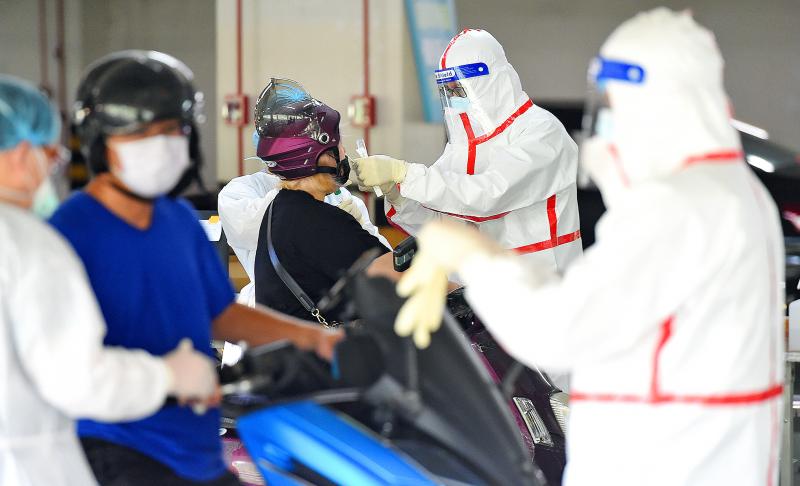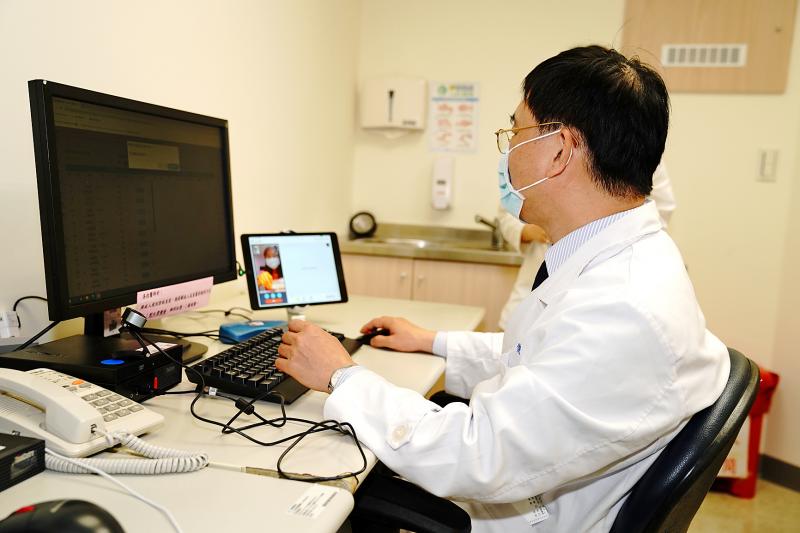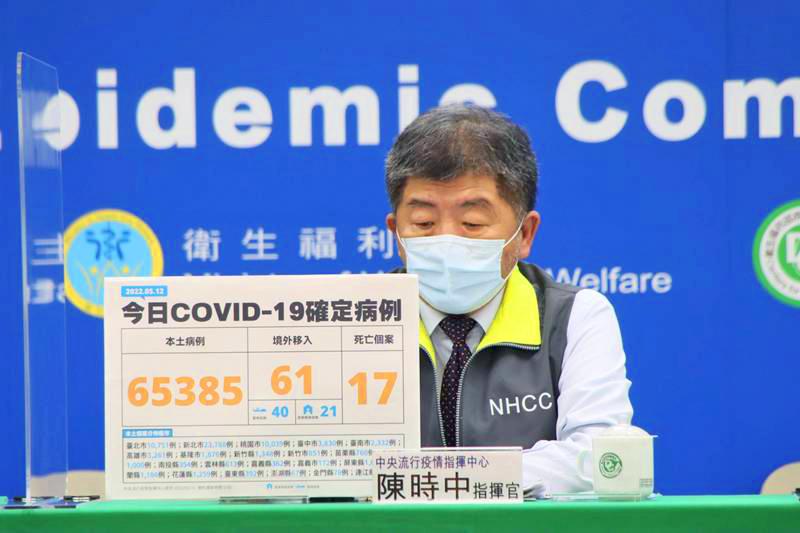Starting today, people with COVID-19 can send a family member or friend to a doctor on their behalf to obtain the oral antiviral drug Paxlovid, or any other medication if determined apporpiriate, the Central Epidemic Command Center (CECC) said yesterday.
Centers for Disease Control Deputy Director-General Philip Lo (羅一鈞), deputy head of the CECC’s medical response division, said the policy was created to allow patients with risk of developing severe symptoms to receive therapeutic medication in a timely manner.
Cases who qualify for Paxlovid, an oral antiviral drug for treating COVID-19, can ask a family member or friend who is not in quarantine or home isolation to visit a doctor to consult on their behalf, he said.

Photo: Liao Chen-huei, Taipei Times
The person should bring the National Health Insurance (NHI) card of the patient in question, along with evidence of a positive COVID-19 test, such as a digital COVID-19 certificate or a screenshot of the test-result page from the NHI app, he said.
If Paxlovid is prescribed, a person can take the prescription to one of 124 hospitals in Taiwan that carry the medication, Lo said.
Also starting yesterday, people in three-day home isolation, four-day self-health management or seven-day home quarantine who test positive for COVID-19 using a rapid antigen test can have their results officially confirmed in a virtual consultation with a physician.

Photo courtesy of Shinkong Wu Ho-su Memorial Hospital
Previously, a polymerase chain reaction (PCR) test at a hospital was required to confirm the positive diagnosis.
Minister of Health and Welfare Chen Shih-chung (陳時中), who heads the CECC, said yesterday that the new policy applies to rapid test kits that use nasal swabs, as well as saliva-based test kits that have been granted emergency use authorization by the Food and Drug Administration.
The policy does not apply to rapid test kits that were obtained abroad, as they are not approved by the government, he added.

Photo courtesy of the CECC
Separately yesterday, the Ministry of Health and Welfare said that the local COVID-19 outbreak has not yet reached its peak, and that severe cases and deaths are expected to rise as the virus is spreading widely in communities.
Centers for Disease Control Director-General Chou Jih-haw (周志浩), who also heads the CECC’s disease surveillance division, made the remarks at a weekly Cabinet meeting yesterday.
From Thursday last week to Wednesday, domestic COVID-19 cases rose by 302,754, a significant increase from 124,403 cases over the previous seven days, Chou said.
Imported cases this week were down 51 percent from the previous week, from 921 cases to 454, he said.
Among the 421,703 domestic cases this year, 894 cases had medium to severe symptoms, with 98 deaths, while 99.79 percent of the cases reported mild or no symptoms, he said.
The ministry is focusing on maintaining effective functioning of the medical system and reducing severe symptomatic cases and deaths.
The nation’s single-day COVID-19 cases exceeded 60,000 for the first time yesterday, with 65,446 new cases and 17 deaths, the CECC said, adding that 61 were imported.
The 17 people who died of COVID-19 were aged from their 60s to 90s. Fifteen had underlying medical conditions, including cardiovascular disease, diabetes, chronic kidney disease, stroke or cancer, CECC data showed.
Six of the cases had not received COVID-19 vaccination, while the others had one or more doses, the data showed.
The CECC also said that 61 people had developed moderate symptoms and 18 had developed severe symptoms.
New Taipei City yesterday reported the highest number of domestic cases — 23,788 — followed by Taipei with 10,751, Taoyuan with 10,039, Taichung with 3,830 and Kaohsiung with 3,261.
Tainan reported 2,332 cases, Keelung 1,876, Hsinchu County 1,348, Hualien County 1,259, Yilan County 1,186, Pingtung County 1,061, Changhua County 1,000, Hsinchu City 851, Miaoli County 760, Yunlin County 613, Taitung County 392, Chiayi County 362, Nantou County 354 and Chiayi City 172.
Kinmen County reported 78 cases, Penghu County 67 and the Matsu Islands five.

Nipah virus infection is to be officially listed as a category 5 notifiable infectious disease in Taiwan in March, while clinical treatment guidelines are being formulated, the Centers for Disease Control (CDC) said yesterday. With Nipah infections being reported in other countries and considering its relatively high fatality rate, the centers on Jan. 16 announced that it would be listed as a notifiable infectious disease to bolster the nation’s systematic early warning system and increase public awareness, the CDC said. Bangladesh reported four fatal cases last year in separate districts, with three linked to raw date palm sap consumption, CDC Epidemic Intelligence

The manufacture of the remaining 28 M1A2T Abrams tanks Taiwan purchased from the US has recently been completed, and they are expected to be delivered within the next one to two months, a source said yesterday. The Ministry of National Defense is arranging cargo ships to transport the tanks to Taiwan as soon as possible, said the source, who is familiar with the matter. The estimated arrival time ranges from late this month to early next month, the source said. The 28 Abrams tanks make up the third and final batch of a total of 108 tanks, valued at about NT$40.5 billion

Two Taiwanese prosecutors were questioned by Chinese security personnel at their hotel during a trip to China’s Henan Province this month, the Mainland Affairs Council (MAC) said yesterday. The officers had personal information on the prosecutors, including “when they were assigned to their posts, their work locations and job titles,” MAC Deputy Minister and spokesman Liang Wen-chieh (梁文傑) said. On top of asking about their agencies and positions, the officers also questioned the prosecutors about the Cross-Strait Joint Crime-Fighting and Judicial Mutual Assistance Agreement, a pact that serves as the framework for Taiwan-China cooperation on combating crime and providing judicial assistance, Liang

A group from the Taiwanese Designers in Australia association yesterday represented Taiwan at the Midsumma Pride March in Melbourne. The march, held in the St. Kilda suburb, is the city’s largest LGBTQIA+ parade and the flagship event of the annual Midsumma Festival. It attracted more than 45,000 spectators who supported the 400 groups and 10,000 marchers that participated this year, the association said. Taiwanese Designers said they organized a team to march for Taiwan this year, joining politicians, government agencies, professionals and community organizations in showing support for LGBTQIA+ people and diverse communities. As the first country in Asia to legalize same-sex